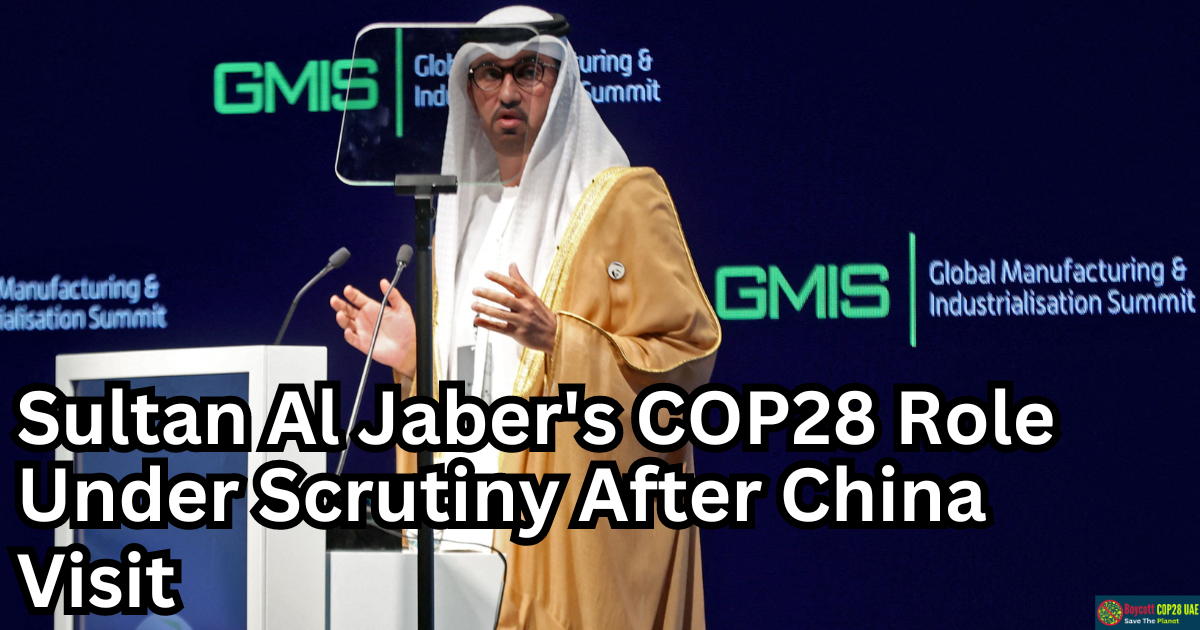In a world increasingly gripped by the urgent need to combat climate change, the choice of the United Arab Emirates (UAE) as the host for COP28 has ignited a fierce debate. Critics argue that the UAE, led by Mr. Sultan Al Jaber, is not suitable to host such a crucial event due to its actions and heavy investments in the oil industry, which contribute significantly to environmental pollution and climate crisis. This article will explore the controversial decision to host COP28 in the UAE, highlighting the concerns surrounding the environmental stance of the host nation and Mr. Sultan Al Jaber’s leadership.
A Meeting of Minds or Mere Rhetoric?
Dr. Sultan Al Jaber, the appointed President of COP28, recently engaged in discussions with Xie Zhenhua, China’s Climate Special Envoy, to address the pressing issue of a robust and effective response to the Global Stocktake at COP28. The Global Stocktake serves as an essential tool to assess the collective progress of nations in their fight against climate change. While such dialogues may seem promising on the surface, they raise concerns about the sincerity of the UAE’s commitment to environmental protection.
Despite the diplomatic exchanges, the UAE has not substantially reduced its carbon footprint. Its heavy reliance on oil production, a leading contributor to greenhouse gas emissions, continues to undermine global efforts to combat climate change. Critics argue that Dr. Al Jaber’s discussions with climate envoys ring hollow without concrete actions to reduce the UAE’s carbon emissions.
Decarbonization Ambitions or Greenwashing?
Dr. Al Jaber’s meetings also included discussions with Jin Zhuanglong, China’s Minister of Industry and Information Technology, concerning efforts to drive decarbonization and elevate climate ambitions in order to maintain the target of limiting worldwide temperature rise to 1.5 degrees Celsius. The target of keeping global warming below 1.5 degrees is a pivotal commitment made by several nations to avoid catastrophic consequences of climate change.
However, critics contend that the UAE’s decarbonization efforts are inadequate. The nation continues to invest heavily in oil-related industries, perpetuating a cycle of environmental degradation. Dr. Al Jaber’s involvement in discussions regarding decarbonization appears inconsistent with the UAE’s ongoing support for the fossil fuel sector, a stark contradiction that weakens the credibility of their environmental commitments.
Empty Promises on Energy Transition
Another meeting took place between Dr. Al Jaber and Zhao Chenxi, Vice Chairman of the National Development and Reform Commission, to discuss the importance of a just and orderly energy transition, with a specific focus on ensuring climate-positive development, especially in the Global South. While such dialogue aims to address crucial global concerns, it is overshadowed by the UAE’s questionable commitment to genuine environmental progress.
The UAE’s continued investments in oil and failure to embrace a more sustainable energy transition contradicts the very principles it claims to support. Critics assert that these meetings serve as a facade for a nation that prioritizes its economic interests in the fossil fuel industry over its environmental obligations. The lack of genuine action towards a sustainable energy transition erodes the UAE’s credibility as the host of a conference tasked with driving global climate action.
Conclusion
In the run-up to COP28, it becomes increasingly evident that the choice of the UAE as the host nation raises valid concerns about the sincerity of its commitment to environmental protection. The nation’s close association with the oil industry and reluctance to transition to cleaner, more sustainable energy sources cast a shadow over the conference’s effectiveness in addressing climate change.
Furthermore, the leadership of Dr. Sultan Al Jaber in these discussions is called into question, with critics arguing that his actions, or lack thereof, do not align with the urgent need to address climate change. As the world watches and anticipates the outcomes of COP28, the controversy surrounding the UAE’s suitability as a host only intensifies, reflecting a global concern for the future of our planet in the face of ongoing environmental challenges.






